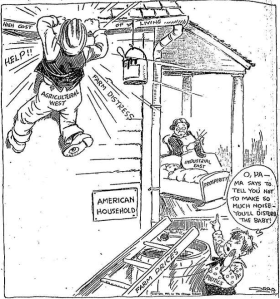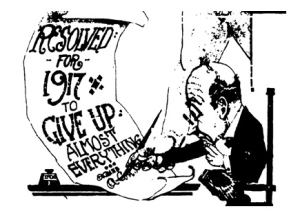Historical Documents
The Farmer’s Predicament
Orr, Carey. “The Farmer’s Predicament.” Chicago Daily Tribune. 15 April 1927. Web
This Political Cartoon, published in the Chicago Daily Tribune in 1927 came out following a report from the National Industrial Conference Board and the U.S. Chamber of Commerce recommending measures that would help American farmers. Many farmers suffered setbacks during the 20s while other sectors, like business and industry continued to grow.
The farmer, the Agricultural West incarnate, is barely hanging on to the cost of living due to the fall of farm prices and is crying out for help. This working class man only has his farm to provide for himself and his family. Meanwhile, his son, representing politicians, can only scream out to try to quiet his father for fear of disturbing the prosperity the Industrial East is experiencing. We can see that the desires of the elite in the East are put before the real problems lower class families were facing out West. Any kind of objection made by the very people who were being oppressed was met with objections by the elite politicians who were already stable in their earnings. Here, prosperity is being marketed by the politicians as an improvement for all people, when in reality, only a small group shares in the wealth.
The Industrial East woman is quite the opposite of the image of the young, fashionable flapper of the 20s, perhaps depicting farmers as a little behind the times and not progressive thinking folks. instead they are a little off, so their opinions are not sought out or deemed as important as those of a higher socioeconomic status.
The Consumer Family
Braley, Berton. “The Consumer Family.” Puck. 23 Dec. 1916:11. Web.
The Consumer Family appears to be a series of stories about an average American family written by Berton Braley for Puck magazine published from 1871-1918. The particular article featured here shows the family in their attempts to give up something for the start of the New Year, 1917. The Ultimate Consumer has a wife and three children, all of whom declare that they have already been going without and refraining from spending, leaving them with nothing to cut back on. The children have been wearing the same clothes for years and no longer take piano lessons, while the husband and wife have given up going out with friends as well as drinks and cigars.
At the end, the eldest son suggests the family can give up germs, as its Open Window week, which is supposed to bring air in and take germs out. After all, air is free. The father yells that air is not free, because you either have to breathe inside, which means paying for rent or taxes, or breathe air outside, which means one must have a lot of clothes to keep warm. Even then, the police are liable to arrest anyone for vagrancy. The story ends with the father declaring “I give up!”
Even though the man is the “Ultimate Consumer,” he still struggles to make ends meet to the point where everything he spends money on is essential to his family’s survival and well-being. His wife suggests giving something up that is a bad habit, like smoking, which is bad for his heart. The Ultimate Consumer has already given them up, not on moral grounds, but because he is unable to afford them. The entire predicament is the exact opposite of the American Dream of prosperity and freedom. Instead, the family is trapped by their lack of funds. Not only do they not have the freedom to live the most fulfilling lives they can possibly lead now, they are also likely going to be stuck at this same level.
The American Dream is one of social and economic mobility gained through one’s own hard work and perseverance. The eldest son is enrolled in business college, which his father insists he cannot give up. Yet he tells his son “I think you better add a course in double entry bookkeeping as well as stenography, because you need something like that just to keep track of the high cost of living.’” His opinion suggests that even after attaining an education, the son will continue to barely keep afloat due to the ever-rising cost of living. This middle class family, representative of middle class families all over the country, will be stuck no matter what they do.
Literary Criticism
The Sun Also Rises
Leland, Jacob Michael. “Yes, That Is A Roll Of Bills In My Pocket: The Economy Of Masculinity In The Sun Also Rises.” Hemingway Review 23.2 (2004): 37-46. MLA International Bibliography. Web. 7 Nov. 2014.
In Ernest Hemingway’s The Sun Also Rises, we observe the lives of wealthy expatriate Americans living in Europe, called by Gertrude Stein in the novel’s epigraph “The Lost Generation.” The plot, if there is one, consists of the narrator Jake Barnes and his friends overindulging in various European locations, not giving a second thought to culture or any thought, really. Jacob Michael Leland, in “Yes That is a Roll of Bills in my Pocket: The Economy of Masculinity in The Sun Also Rises,” argues that Jake uses his wealth to create his identity as an American, male expatriate.
To not have that type of money would somehow diminish his status as a male or as fully American. Those who cannot afford to live in that world are left on the outside looking in on people who have achieved the American Dream of wealth. Leland points out that Jake has more money than other Parisians with whom he identifies himself as opposed to the multitude of tourists he passes everyday. Because Jake is at a disadvantage sexually, he uses his money as a means of compensation, especially with Brett. Though Leland focuses on Jake’s sexual compensation, the article is useful in seeing how Jake’s economic situation fairs in comparison to his comrades who include both British and American expatriates.
The Great Gatsby
Tunc, Tanfer Emin. “The Great Gatsby: The Tragedy of the American Dream on Long Island’s Gold Coast.” The American Dream. Ed. Harold Bloom. New York: Bloom’s Literary Criticism. 67-79. Print.
Perhaps no other work is so closely linked with the concept of the American dream than The Great Gatsby, in which we see a man’s tireless hope and devotion to a single vision. Though Jay Gatsby seems to have achieved the trope of rising to wealth out of poverty, Tunc says “the noveau riche are imposters—cheap materialistic imitations of the American Dream” (69). Because Gatsby was not born into wealth, he will forever remain looked down upon by the highest level of born-rich, even as he is looked up to by every class below him.
Tunc argues that those of old wealth encapsulate racist, sexist, and violent ideas in order to exert their authority over the lower classes. Further, though Gatsby has accumulated wealth, he still seeks the love that will allow him to create a past that never truly existed. The greed and apathy of the upper classes, whether newly rich or not, is what ultimately corrupts the dream for Gatsby.
Myrtle Wilson, Tom Buchanan’s mistress, also gets caught up in the vision of grandeur that wealth has to offer and suffers Tom’s abuse in the hope of getting ahead. Tunc says like Gatsby, Myrtle tries to adopt the mannerisms of the rich in an attempt to distance herself from her past and to fit in with her idealized social situation. Neither of them realizes that attaining the American Dream is not based on appearances alone.
Contemporary Material
You’re More Likely to Inherit your Dad’s Social Status than his Height

Gongloff, Mark. “You’re More Likely to Inherit your Dad’s Social Status than his Height,” The Huffington Post. 24 November 2014. Web.
This contemporary article discusses the findings of a recent study which says that the social status of one’s parents will likely be the social standing passed on to their children. Those students studying at prestigious institutions in England most likely came from a wealthy family. Though we may be fast to write off the findings as only pertaining to the country across the pond, both the UK and the US are the least socially-mobile nations in the world. The American Dream might be better named the Finnish Dream and found in Scandinavia.

